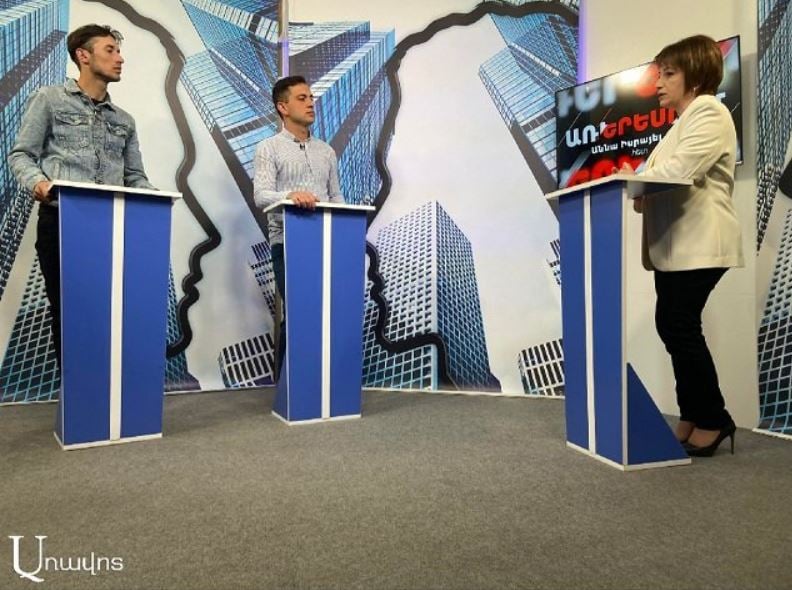The guests of the “Areresum (Confrontation)” program, painter Arthur Avagyan, a participant in the 44-day war, and political scientist Nver Kirakosyan, went on a five-day hunger strike, declaring that their task was to make the public aware that Artsakh was really endangered. On April 22, they announced that they considered that problem solved, and they are going on a hunger strike. Earlier, they said that this problem will be solved when the critical part of the generation of independence gathers, which will say, “I own my heritage, I am worried and I am ready to take action for that, to refuse to write only statuses or to remain indifferent. When we have that situation, we will prove that the hunger strike has solved its problem.”
Nver Kirakosyan, who made this assertion, detailed during the program, “At the same time, we were constantly emphasizing that measuring the critical mass in numbers is not an appropriate approach, as the critical mass is a group of people who are ready for action. That is, if they do not satisfy their demand in that regard, they perform their actions. And yes, we communicated with thousands of people in 5 days. We used to say that the source of our energy is the contacts with those people. We saw the most important thing in the eyes of the people – the conviction that they will not really leave Artsakh, the people living in Artsakh alone.” At the last sitting of the government, Prime Minister Nikol Pashinyan announced, “The forces that want the Armenian government to adopt toasts, as a result of which a new war will be unleashed, Artsakh will be emptied of Armenians. They have surrendered, they are surrendering not only Artsakh, but also the Republic of Armenia.” Artur Avagyan answered the question whether he would like the RA government to adopt such “toasts.”
“Was the liberation of Artsakh a toast? If we look at it that way, we must say that the Zeytun uprising was a toast․․․ that is not what happens. There are circumstances when it is not enough just to take your resources into account and say, ‘Oh, they have a lot more resources, so I have to give in.’” And he quoted a conversation with a pro-government young man during the days of the hunger strike, “He was telling me to be rational because we do not have the strength, we can not defend Artsakh.”
Artur Avagyan responded, bringing a household example, “Imagine you are standing with your girlfriend. Then they come in ten cars, a boy comes, takes your girlfriend by the hand and leaves. Now, if we look rationally, you should say, yes, I am weak, I can not protect that girl, so let him take her. But shouldn’t you think the opposite way there, because if you let her go, your psychology will change?” Referring to the statement that the opponents of the peace era are leading the people to a new war, the power of which we do not have now, Nver Kirakosyan said, “It is a great manipulation that aggravates the same fears of the already exhausted and feared society. They are constantly pressing on the fears, as a place of bleeding, to get that ‘effect’ that the people do not wake up from this situation.”
Read also
Meanwhile, according to him, “Your weakness is the first signal for you to be treated rudely, just what we call war.” By the way, he made a remarkable comment when we quoted the analysis that people do not take to the streets today because they do not understand what is being offered to them. People gather in the square to influence the fate of the country, not for bold speeches. “There are understandable reasons that people are exhausted, somewhat deceived and disappointed. But a large number of people do not go out on the streets because it is not pleasant. Whenever it is pleasant, they will go out. This is painful.”
According to Nver Kirakosyan, “Young people do not need an idea, they do not need substantive discussions. A large number of young people need fun. As a result of all this we can prove this․․․ People do not even realize this moment due to the dictation of the idea, the instinct of self-defense. They just have to take to the streets with technology. And we saw that in 2018, the technologies worked clearly.”
Anna ISRAELYAN




















































